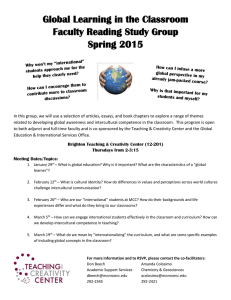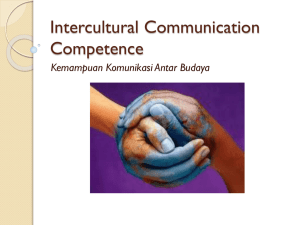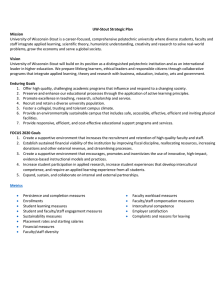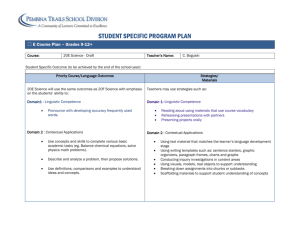Semester Subject Title ECTS
advertisement
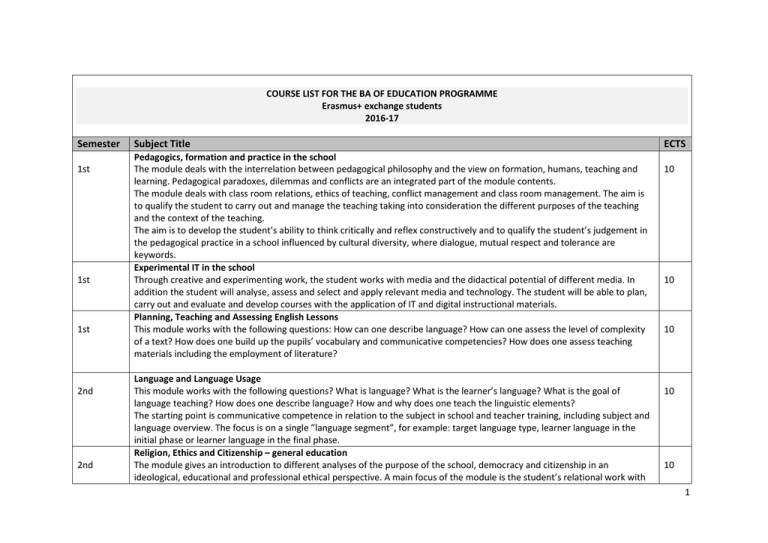
COURSE LIST FOR THE BA OF EDUCATION PROGRAMME Erasmus+ exchange students 2016-17 Semester 1st 1st 1st 2nd 2nd Subject Title Pedagogics, formation and practice in the school The module deals with the interrelation between pedagogical philosophy and the view on formation, humans, teaching and learning. Pedagogical paradoxes, dilemmas and conflicts are an integrated part of the module contents. The module deals with class room relations, ethics of teaching, conflict management and class room management. The aim is to qualify the student to carry out and manage the teaching taking into consideration the different purposes of the teaching and the context of the teaching. The aim is to develop the student’s ability to think critically and reflex constructively and to qualify the student’s judgement in the pedagogical practice in a school influenced by cultural diversity, where dialogue, mutual respect and tolerance are keywords. Experimental IT in the school Through creative and experimenting work, the student works with media and the didactical potential of different media. In addition the student will analyse, assess and select and apply relevant media and technology. The student will be able to plan, carry out and evaluate and develop courses with the application of IT and digital instructional materials. Planning, Teaching and Assessing English Lessons This module works with the following questions: How can one describe language? How can one assess the level of complexity of a text? How does one build up the pupils’ vocabulary and communicative competencies? How does one assess teaching materials including the employment of literature? Language and Language Usage This module works with the following questions? What is language? What is the learner’s language? What is the goal of language teaching? How does one describe language? How and why does one teach the linguistic elements? The starting point is communicative competence in relation to the subject in school and teacher training, including subject and language overview. The focus is on a single ”language segment”, for example: target language type, learner language in the initial phase or learner language in the final phase. Religion, Ethics and Citizenship – general education The module gives an introduction to different analyses of the purpose of the school, democracy and citizenship in an ideological, educational and professional ethical perspective. A main focus of the module is the student’s relational work with ECTS 10 10 10 10 10 1 the values of the school and the relation to the teaching profession in respect of the cultural and religious diversity that characterizes the school and society. 2nd 3rd 3rd 3rd 4th Teaching practice Practical training in a local school. Processes in Language Acquisition and Communication Skills This module works with the following questions: How does one learn language? How does language development happen? What are communicative skills? What is the relationship between communication and language acquisition? How does one describe language acquisition and communicative skills? How and why does the teacher function as a linguistic guide? How does the teacher organize his or her teaching so that is creates opportunity for language acquisition? What is the correlation between the overview of language, acquisition, subject and the actual teaching? Intercultural competences and internationalization This module works with the following questions: What is culture? What is intercultural competence? What is international cooperation and interaction? What is and how can the teacher’s textual competence be defined? What is the interrelation between language and culture? How does the teacher prepare and plan his or her teaching in order to develop the pupil’s intercultural understanding and intercultural competence through the international dimension, through the work with texts and IT based working methods? Intercultural competence in language teaching is about the work with intercultural competence from a linguistic and cultural perspective that includes knowledge about culture and society in English speaking countries and in a global perspective. The module includes working with textual competence based on different genres within the extended textual concept including literature pedagogics and selection criteria for texts aimed at language teaching in the primary and lower secondary school. The teacher’s planning of lessons The module gives an introduction to the planning, implementation and evaluation of teaching. The module focuses on didactic analysis, reflection and action as well as development of teaching. The module deals with these four themes: 1. Planning of teaching 2. Organization and working methods 3. Evaluation 4. Entrepreneurship and formation Inclusion, subjects and teaching practice This module works with the students’ competencies to plan, teach and assess differentiating and inclusive teaching in a teaching subject with a special focus on the different learning strategies and needs of the pupils as well as to provide an understanding of the preconditions of inclusion. 10 10 10 10 10 2 4th 4th 5th Culture, History and Society in English speaking countries Interdisciplinary module within the subjects English, Social Science and History. The module deals with selected historical and societal aspects and is completed with a project report. Examples of themes and subjects are formation of states/federal states including perceptions of democracy and democratic processes, expansionism as a theme in US history, colonialism and the British Commonwealth, the American Civil War and the civil rights movements, Pax Americana, literary currents in British and American culture, media and cultural influence. Teaching practice Practical training in a local school. The pupil’s academic, social and personal learning and development This module deals with the pupil’s learning in a learning community. The learning processes and the development of the pupil as a member of a diverse group is the main focus of the module. The main focus of the module is the learning processes and the development of the pupil as a member of a diverse group in which every pupil with its personal, social and cultural preconditions is a part of the school community. 10 10 10 The module deals with these three themes: The development, socialization and identity of the pupil Learning, learning environment and learning management The teacher’s interaction and communication with the pupils 3
